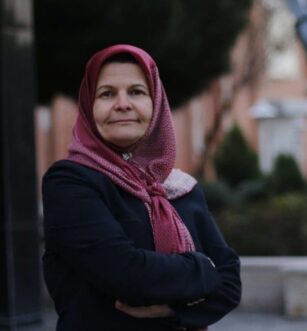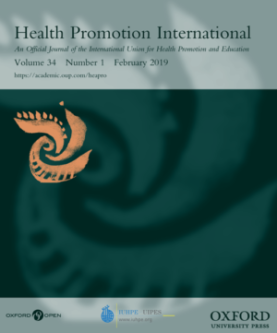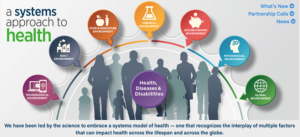Nastaran Keshavarz Mohammadi
Associate Professor of Health Promotion, Department of Public Health | Shahid Beheshti University of Medical Sciences
Complexity-Informed Health Promotion

My journey in the world of complexity started in 2004, while I was studying my Ph.D. in University of Sydney. I explored its potential to contribute to better understanding of challenges of creating sustainable health promoting changes in settings such as schools. Since then, I am a believer! and deeply fascinated by its concepts, frameworks and theories. I have found it very helpful in understanding the complexity of human beings, as individuals or groups, and also the complexity of health, as expected from complexity science. I argued in my Ph.D thesis that organizations should be considered “Social complex adaptive systems/SCAS”. I think health also needs to be considered as a “complex social phenomenon”. I am interested to use the lens of complexity, special Complex adaptive systems theory to explore different health challenges at individual, community, organization, national and even international level. from unhealthy behavior to public policy. Albert Einstein said that ‘Figuring out how to think about the problem’ had been most helpful for development of his theory of relativity . Perhaps it is time for the health promotion community to find alternative ways of thinking about its problems. I would like to propose ‘complexity science’ as an alternative new way of thinking about our problems and their solutions.
Read More About Me…
2018- 2019 Visiting professor, Agent- based modeming of social systems and individual decision-making process, UZH, Switzerland
2014- present Associate professor of Health Promotion, Shahid Beheshti University of Medical Sciences, Tehran, Iran
2010-2014 Assistant professor of Health Promotion, Shahid Beheshti University of Medical Sciences, Tehran
2008- 2010 Honorary research fellow, School of Public Health, The University of Sydney, Australia
2008- 2010 Assistant professor of Health Promotion, Qazvin University of Medical Sciences, Qazvin, Iran
2007- WHO Research Assistant
2006- 2008 Academic Staff (part-time) at School of Public Health, University of Sydney
2004- 2005 Research Assistance, School of Behavioural and Community Health Sciences, The University of Sydney
2005- Research assistance, WHO headquarter, Geneva
1997- 2004 Senior lecturer of health Education, Qazvin University of Medical Sciences, Qazvin, Iran
2005- 2009 Registered Midwife in New South Wales, Australia
1393-1396 Registered Midwife, Iran
International
2021- Present WHO advisor, Consultation on the development of a global measurement tool to assess Population Health Literacy, Geneva
2018- Present Co-Chair of Scientific Committee , UNESCO Global
Chair on health and education, UNESCO, Paris, France
2017- Present Associate Editor, Health Promotion International
2009 Stream manager for IUHPE on line forum on” diversity and equity in health promotion capacity development”
2008- 2011 ISECN Global Secretary for Equity and Diversity
2009- 2013 Chair of international affairs, Iranian health education and promotion association
2011 Chair of International affairs, First international congress of health promotion in Iran
2007 IUHPE Student and Early Career (ISCEN) contact person in Middle East
2004- 2008 Post graduate Representative for Research Training SubCommittee, Faculty of Health Sciences, University of Sydney, Australia
2004- 2005 Postgraduate Representative for the School of Behavioural & Community Health Sciences, The University of Sydney
2012 WHO temporary, Health Promotion adviser
2009 WHO temporary Health promotion adviser
2009 Sponsored invitation to attend WHO global health promotion
meeting conference Kenya
2007 WHO temporary adviser, School Health Promotion
2007 Sponsored invitation to attend WHO technical meeting on school health in Canada
National Leadership
2021-Chair of scientific sub-committee of urban health, 12th Tehran Urban Forum
2017 -2018 Chair, national working group on women’s, Vice Presidency
for Women and Family Affairs, Presidential Office, Tehran
2017- Chair of Scientific Committee (Judges committee), Second national
festival of Social determinants of health (SDH), Iran
2017- Chair of Scientific Committee, First National Conference of Health
Promoting Hospitals, Tehran, Iran
2016- Chair of Scientific Committee, First national festival of SDH, Iran
2016- 2017 Vic -chair for strategic planning, Deputy of social affairs,
Ministry of Health, Iran
2015 Chair of Scientific Committee, Second national conference women
health promotion at workplace, Tehran, Iran
2015 Chair of Scientific Committee, First conference on workplace health
promotion, Tehran, Iran
2014 Chair of Scientific Committee, First national conference of women’
health promotion at workplace, Tehran, Iran
2009-2013 Executive board member, Iranian health education and
promotion association
2008- 2010 Director of Health Promotion Research Unit, School of Public
Health, Qazvin University of Medical Sciences, Iran
2008 -2010 Head of Department of public health, Qazvin University of
Medical Sciences, Iran

Oxford University Press | Cited By 7
One step back toward the future of health promotion: complexity-informed health promotion
More than three decades since health promotion was codified in the Ottawa Charter, the health promotion field still faces the chronic problem of less-than-successful interventions (Green et al., 1986; WHO, 2009; Keshavarz Mohammadi et al., 2010a,b). Health promotion is also challenged by the replicability of interventions that are considered Best Practices. We still face difficulties explaining unforeseen impacts and side effects (Gugglberger, 2018), delayed effects, no effects or effects not proportionally relevant to the size or sophistication of the intervention. Explanations for this include the complexity of change, and resource limitations, but still many issues in explaining the less than optimal effects of health promotion remain unresolved.
From the complexity science perspective, as well as from the more empirical evidence base, the problem with this approach is that it ignores the networked and multi-layered nature of determinants and their emergent multipath influence on health and wellbeing (Helbing, 2013; Eckersley, 2015; Hawe, 2015). The network structure of links in complex systems implies that one health determinant can simultaneously influence more than one other factor directly or indirectly, so there are multiple potential paths of cause and effect, not a single path. Another important point is that interactions or influences between factors are often mutual and reciprocal which makes them change together, or ‘co-vary’. Sometimes one factor can mediate, weaken or strengthen the effect of other factors. As a result, change in one part of the system can cause often non-linear and unpredictable changes in other parts. From this perspective, it is also the sequence and combination of determinants of health or conditions of the target individual or settings which determines health status, not only their mere existence. A common example is that not all smokers develop disease (such as lung cancer), their emergence depending on risk factors and productive factors and their sequences and strength and the way they suppress/boost the effect on health.
Keshavarz Mohammadi, N. (2020). Diffusion of complexity science into health promotion research and practice: foundations for a complex future , Health Promotion International, https://doi.org/10.1093/heapro/daaa115
Keshavarz, N.(2010). Complexity science, schools and health. Lambert Academic Publication, Germany
Sharif, Z., Peiravian, F., Salamzadeh, J., Keshavarz Mohammadi, N., & Jalalimanesh, A. (2021). Irrational use of antibiotics in Iran from the perspective of complex adaptive systems: redefining the
challenge. BMC Public Health, 21(1), 1-14. https://doi.org/10.1186/s12889-021-10619-w
Keshavarz Mohammadi, N. (2019). One step back toward the future of health promotion:
complexity-informed health promotion. Health Promotion International, Volume 34, Issue 4, Pages 635–639, https://doi.org/10.1093/heapro/daz084

News and Posts
 Medical Journalism VS Health Journalism - News coverage in Media is a complex phenomenon! Health-related issues are widely covered in news agencies by medical and health journalists. Thequantity, format and quality of their coverage influence the general public as well as policymakers andprofessions. Current studies and observations suggest that news agencies are more dominated by medicaltopics (disease, symptoms, epidemiology, treatment and […]
Medical Journalism VS Health Journalism - News coverage in Media is a complex phenomenon! Health-related issues are widely covered in news agencies by medical and health journalists. Thequantity, format and quality of their coverage influence the general public as well as policymakers andprofessions. Current studies and observations suggest that news agencies are more dominated by medicaltopics (disease, symptoms, epidemiology, treatment and […] From MDGs to SDGs: New Impetus to Advance Health in Iran - Problem: The sustainable development goals (SDGs) and their associated targets and indicators provide a global framework for advancing health in development, which must be adapted to the needs of each country. Approach: Building on previous experience with millennium development goals (MDGs), the Islamic Republic of Iran is advancing health under the SDGs by targeting non-communicable diseases, which […]
From MDGs to SDGs: New Impetus to Advance Health in Iran - Problem: The sustainable development goals (SDGs) and their associated targets and indicators provide a global framework for advancing health in development, which must be adapted to the needs of each country. Approach: Building on previous experience with millennium development goals (MDGs), the Islamic Republic of Iran is advancing health under the SDGs by targeting non-communicable diseases, which […] Irrational use of antibiotics - Irrational use of antibiotics is proving to be a major concern to the health systems globally. This results in antibiotics resistance and increases health care costs. In Iran, despite many years of research, appreciable efforts, and policymaking to avoid irrational use of antibiotics, yet indicators show suboptimal use of antibiotics, pointing to an urgent need […]
Irrational use of antibiotics - Irrational use of antibiotics is proving to be a major concern to the health systems globally. This results in antibiotics resistance and increases health care costs. In Iran, despite many years of research, appreciable efforts, and policymaking to avoid irrational use of antibiotics, yet indicators show suboptimal use of antibiotics, pointing to an urgent need […]Media